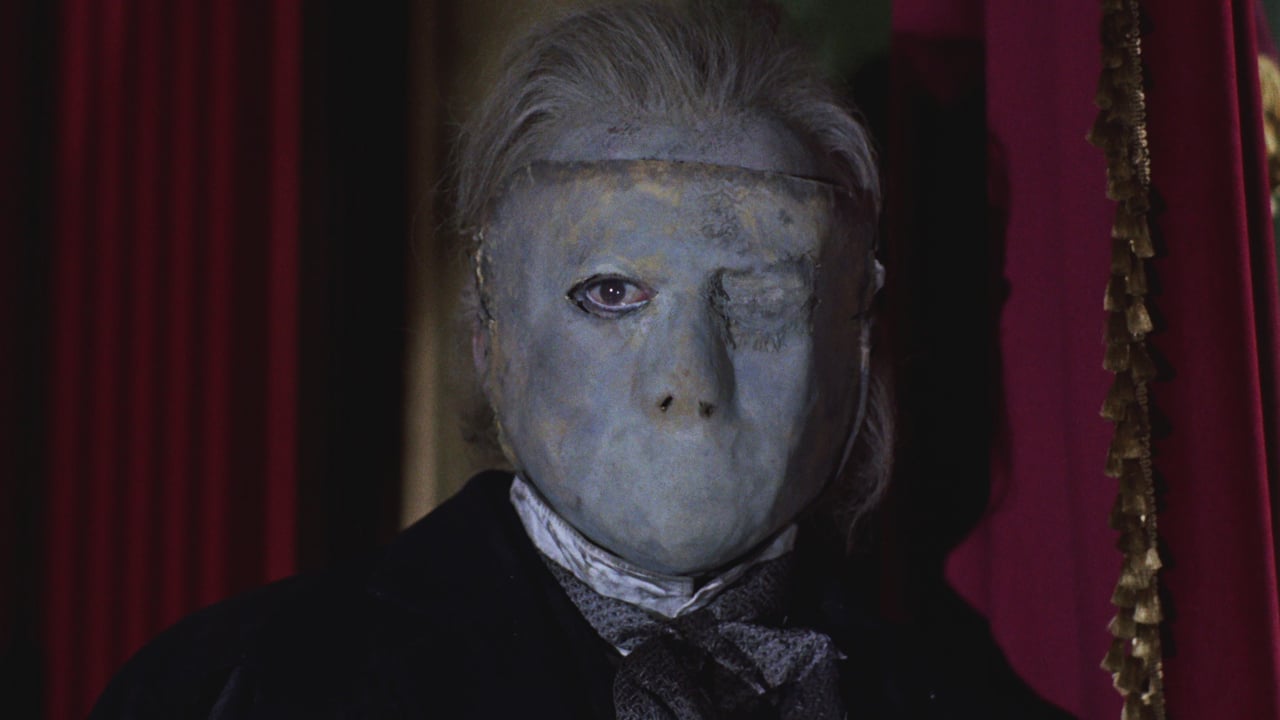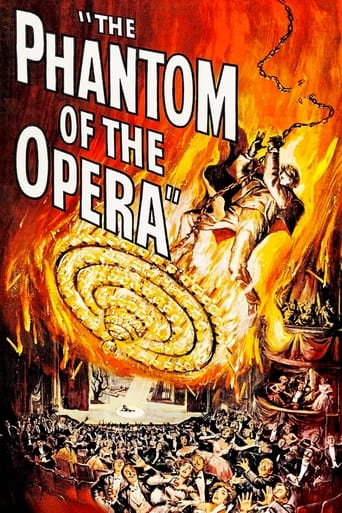



Overrated
Masterful Cinema
just watch it!
A different way of telling a story
As far as adaptations of The Phantom of the Opera goes(excluding the Andrew Lloyd Webber musical), this 1962 Hammer version is not as good as Lon Chaney's, which is the best version, but it's superior to the Claude Rains version(though I do prefer Rains over Herbert Lom).It does have its problems, with too much time spent on the opera and the romance and not enough of the Phantom, which does undermine the tension, sense of dread and horror. Sadly, the opera numbers, while musically good, are staged awkwardly and really do slow the film down. The romance is rather saccharine, and the chemistry between the two 'heroes' a little bland. Heather Sears also plays Christine too low-key and the script, while with some intelligent moments, does plod sometimes and has a little too much talk.However, it is very lavishly made (one of the better looking early-60s Hammer films) with truly marvellous interiors of the opera house, rich vibrant colours and opulent costumes. It is beautifully and spine-chillingly scored, though James Bernard would have been an even better fit for composer. The story is less than perfect, but does offer some effective moments. The close up of the eye is really quite chilling and enough to make one jump, while the grasping hand over the stage and the lowering of the gas lamp are indeed very suspenseful, Phantom's back-story is interesting and makes one empathise with him and the ending is incredibly moving.Terrence Fisher's direction is technically accomplished and does evoke some suspense and atmosphere, though his story-telling has been better elsewhere. Regarding the acting, Michael Gough steals the show being chillingly vile as a true slimeball with no redeeming qualities of a character. Herbert Lom is a great contrast as the Phantom, under heavy and effective make-up he is a sympathetic and tragic figure and it is quite a poignant performance, though not without a few scary moments. Edward De Souza is charming.In conclusion, not among the best of Hammer by a long shot and could have been better, but still manages to be pretty good. 7/10 Bethany Cox
View MoreIn this version of The Phantom Of The Opera, the hideous phantom lurks in the sewers and catacombs of London instead of Paris. And in this third version bits of a real opera by British composer Edwin Astley highlight the musical portion of the film. That's important because in this telling of the tale, the phantom has a singular interest in this particular work.Stepping into the shoes of Lon Chaney and Claude Rains is Herbert Lom. Because this film is done in flashback Lom is given less of a chance to create his character in the way his predecessors did. Still Lom as he did in Night And The City manages to get across both the poignancy and the evil that he's sunk to. I would also compare his characterization of Professor Petri here with what he did in Flame Over India where he got across sympathy for a character who was a terrorist.The truly evil one here is Michael Gough who is a classic Victorian rakehell whom if he were slightly of better character and given to a bit of introspection, we could hear some Oscar Wilde aphorisms coming out of his mouth. But his Lord D'Arcy hasn't got any redeeming features whatsover. Kind of like Liberty Valance which also came out in 1962.The young lovers here are producer Edward DeSouza and Heather Sears the singer that Lom takes an interest in. I looked to see who might have dubbed Sears for the opera sequences and found no credit. If she did it herself, truly remarkable and why didn't that part of her talent be better known.I saw an edited version of this on YouTube and I'm convinced they involved the end of some characters in a ghastly fashion. I'd like to see a director's cut if possible.
View MoreThe enduring story gets another imagining thanks to Britain's legendary Hammer Studios. The title character, a professor / composer who had his music for an opera stolen by a nefarious opportunist, is badly disfigured when trying to prevent programmes from being printed without his name on them. Now he's fixated on a young opera singer whom he wishes to sing only for him. This version unfortunately feels a little rushed and not quite meaty enough, with too little dramatic weight. It just feels a little *flat*, which is too bad. It puts a new spin on its main character, however, that may either interest or put off the viewer, turning The Phantom into a tragic hero rather than a figure of any true malice. It is quite possible to feel sympathy for the character, as played by the talented Herbert Lom, and of course one can't help but be utterly disgusted with his nemesis, the sleazy Lord Ambrose D'Arcy, portrayed with his typical gusto by Michael Gough. Gough easily walks away with the movie. Compared to these two, the performances of pretty Heather Sears as Christine and likable Edward de Souza as Harry just aren't that entertaining. Despite typically meticulous production design / art direction (by Bernard Robinson and Don Mingaye), cinematography (by Arthur Grant), and set decoration, this isn't as thickly atmospheric as other Hammer productions, and fails to really inspire any sort of menace or tension. It's a shame, knowing that Hammer could easily have done better with this material. Gough, certainly, makes it all worthwhile, and the appearances of old pros such as Thorley Walters, Harold Goodwin, Martin Miller, Marne Maitland, Miriam Karlin, Patrick Troughton, Michael Ripper, Miles Malleson, and Ian Wilson are great fun to watch. The sequences in the sewer lair are the best, with the operatic numbers, although hardly gratuitous, tending to slow things down. It's still a good film but its full potential isn't realized. Seven out of 10.
View MoreThe Phantom of the Opera is out of Hammer Film Productions and directed by Terence Fisher. Based on the Gaston Leroux novel, the screenplay is written by John Elder and it stars Herbert Lom, Heather Sears, Edward de Souza and Michael Gough. Filmed in Eastman Color, cinematography is by Arthur Grant and music by Edwin Astley.The latest opera production of Joan of Arc is beset with problems, prompting many to believe it's the work of a mysterious phantom who haunts those involved with the show.It has been the basis for a number of adaptations, the Leroux novel's core story proving to be fascinating enough to prompt writers, film makers and musical directors to produce their take on it. Of the film versions, it's still the Lon Chaney silent of 1925 that carries the highest horror value, but for style and substance I feel Hammer's version is the best of the bunch. Fisher's film is played wonderfully straight, the production is given much care and consideration, but in the main the makers let the story sell itself. The characters remain interesting and in the case of the phantom himself, he smartly gets a back story shown late in the day amid off-kilter camera angles. This really gives the film a dramatic thrust as it heads into the finale, where the pay off is exciting and emotionally tight (one of the finest tear sheds in cinema is right here).A voice so wonderful that theatres all over the world will be filled with your admirers.Cast wise the film is led superbly by Lom's performance as the sad and tragic phantom. Lom manages to elicit sympathy with minimal dialogue and pure body language, giving this phantom an irresistible vulnerability that hits home hard as the film closes down. Around him it's Gough who is having the most fun playing villain of the piece Ambrose D'Arcy, and he does it well. De Souza is adequate as love interest Harry Hunter, but Sears, whilst certainly pretty and a decent actress, lacks believability in the scenes shared with the phantom. Note worthy is a quality cameo that comes from Patrick Troughton; even if it does make us hanker for more of him in the picture.Fisher's direction is tight and smooth, if lacking some of the camera flourishes that other Hammer films have benefited from. While Grant's Eastman Color photography adds a zest to the period flavouring by bringing the well designed sets to the fore. Astley's music is standard genre stuff, but easy listening for sure. Bonus is to hear Toccata and Fugue in D minor, it's now disputed as to if it actually was composed by Johann Sebastian Bach, but regardless it's a haunting piece of organ music that has the power to induce chills down the old spinal cord area. Particularly when used location wise as it is here.A lovely adaptation of the source, Hammer's version may not be as horror based as some would like, but it more than makes up for that with style, substance and a quality turn from the leading man. 8/10
View More